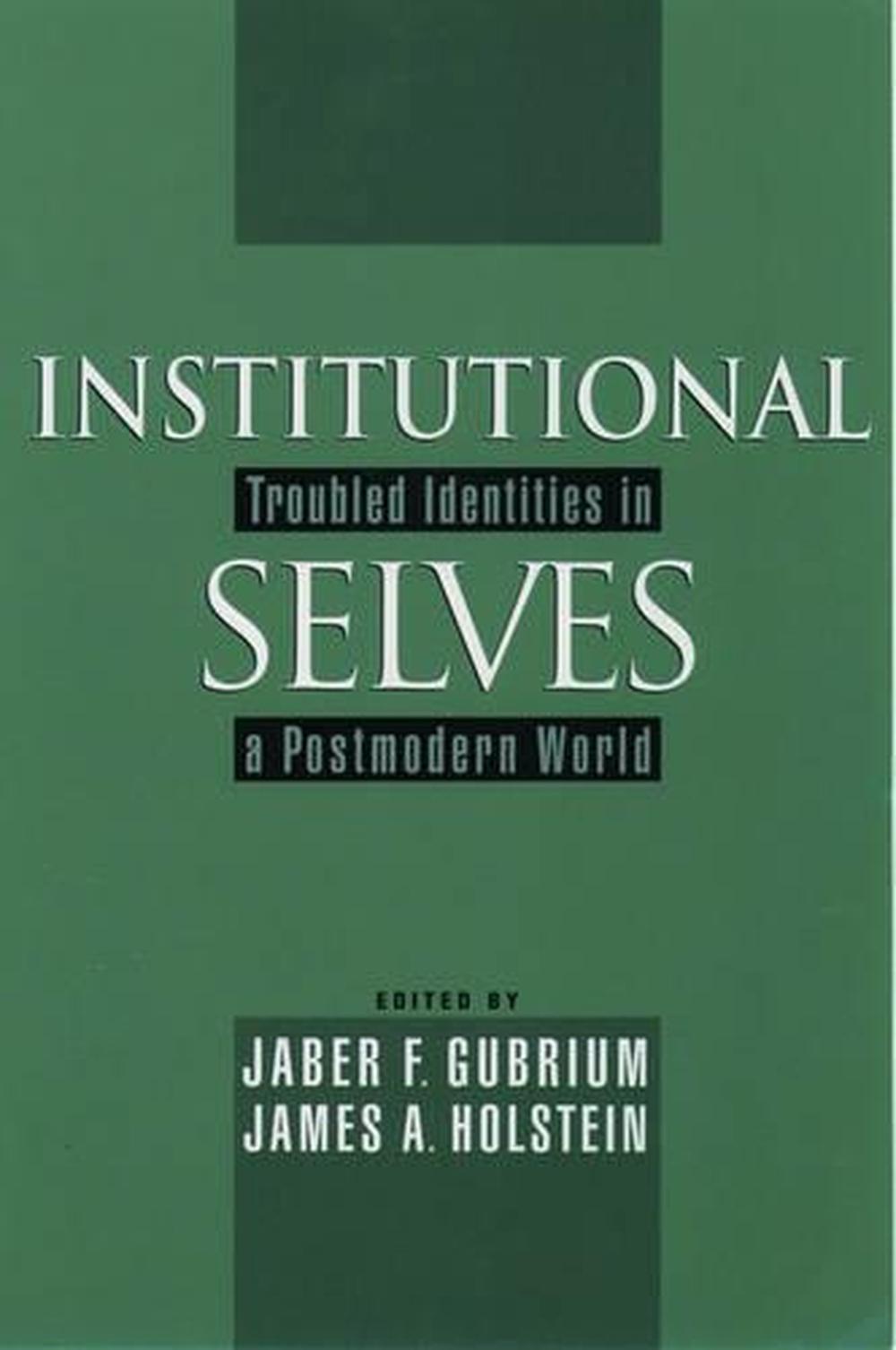
Institutional Selves
by Gubrium, Holstein
"Institutional Selves" highlights the process of self construction in a variety of institutional settings that contend with social and personal troubles. These organisations are virtually in the business of constructing the selves they need to do their work.
Paperback
English
Brand New
Publisher Description
Today, identities are created and selves are constructed in more organizational settings than ever before. Institutions large and small-from psychiatric hospitals, schools, and prisons to job clinics, counseling centers, and support groups-are virtually in the business of self construction. New institutions not only produce new forms of identity by presenting additional options for who and what we are but also place practical limits on the range of possible selveswe can be. Institutional Selves acknowledges the socially practical self we live by. It brings together nine distinctive chapters that collectively address the institutional construction oftroubled identities. From the victims and villains of television talk shows, to battered women in support groups, to the violent selves of prison inmates, this book illustrates how selves are organizationally informed and structured in institutional practice. The institutional construction of selves is an especially interesting issue as social problems, their causes, and their victims are endlessly reinterpreted by the various organizations devoted to helping resolve associated troubles. Thisbook deals with fundamental and complex issues in a well-illustrated, multi-faceted manner. It provides common vocabulary that offers students a consistent language for discussing the construction oftroubled identities. The style of the book is accessible and appropriate to a wide range of undergraduate students in sociology. The book neither "talks down" to the novice nor strains the patience of more experienced researchers. It can be used to lay the foundation for discussion of how the self is constructed in today's world by linking the social psychology of the self to the organizational processing of deviance and social problems.
Author Biography
Jaber F. Gubrium is professor and chair of sociology at the University of Missouri. He has an extensive record of research on the social organization of care in human service institutions. His publications include numerous books and articles on aging, family, the life course, medicalization, and representational practice in therapeutic context.
Table of Contents
PrefaceNotes on ContributorsIntroduction: Trying Times, Troubles SelvesPart I: Institutional IdentitiesKathleen S. Lowney and James A. Holstein: Victims, Villains, and Talk Show SelvesMelvin Pollner and Jill Stein: Doubled Over in Laughter: Humor and the Construction of Selves in Alcoholics AnonymousGale Miller: Changing the Subject: Self-Construction in Brief TherapyDarin Weinberg: Self-Empowerment in Two Therapeutic CommunitiesPart II: Constructing Institutional SelvesDonileen R. Loseke: Lived Realities and Formula Stories of "Battered Women"Joseph Hopper: Contested Selves in Divorce ProceedingsSusan E. Chase: Universities as Discursive Environments for Sexual Identity ConstructionJ. William (Jack) Spencer: Self-Presentation and Organizational Processing in a Human Service AgencyKathryn J. Fox: Self-Change and Resistance in PrisonAuthor IndexSubject Index
Long Description
Today, identities are created and selves are constructed in more organizational settings than ever before. Institutions large and small-from psychiatric hospitals, schools, and prisons to job clinics, counseling centers, and support groups-are virtually in the business of self construction. New institutions not only produce new forms of identity by presenting additional options for who and what we are but also place practical limits on the range of possible selves
we can be. Institutional Selves acknowledges the socially practical self we live by. It brings together nine distinctive chapters that collectively address the institutional construction of troubled identities. From the victims and villains of television talk shows, to battered women in
support groups, to the violent selves of prison inmates, this book illustrates how selves are organizationally informed and structured in institutional practice. The institutional construction of selves is an especially interesting issue as social problems, their causes, and their victims are endlessly reinterpreted by the various organizations devoted to helping resolve associated troubles. This book deals with fundamental and complex issues in a well-illustrated, multi-faceted manner. It
provides common vocabulary that offers students a consistent language for discussing the construction of troubled identities. The style of the book is accessible and appropriate to a wide range of undergraduate students in sociology. The book neither "talks down" to the novice nor strains the patience of
more experienced researchers. It can be used to lay the foundation for discussion of how the self is constructed in today's world by linking the social psychology of the self to the organizational processing of deviance and social problems.
Promotional "Headline"
Notes on Contributors Preface Introduction Trying Times, Troubled Selves Part I: Institutional Identities Kathleen S. Lowney and James A. Holstein: Victims, Villains, and Talk Show Selves Melvin Pollner and Jill Stein: Doubled-Over in Laughter: Humor and the Construction of Selves in Alcoholics Anonymous Gale Miller: Changing the Subject: Self Construction in Brief Therapy Darin Weinberg: Self Empowerment in Two Therapeutic Communities Part II: Constructing Institutional Selves Donileen R. Loseke: Lived Realities and Formula Stories of "Battered Women" Joseph Hopper: Contested Selves in Divorce Proceedings Susan E. Chase: University as Discursive Environments for Sexual Identity Construction J. William (Jack) Spencer: Constructing Service-Worthiness in a Human Service Agency Kathryn J. Fox: Self Change and Resistance in Prison
Feature
Deals with fundamental and complex conceptual issues in a well-illustrated, wide-rangin fashion. The self is a central theme in a wide variety of sociological (and psychological) fields of study.
Troubled identity is the concern of the human services as well as the social sciences.
Combines traditional interests with postmodern concerns.
Arguments are illustrated with empirical materials in each chapter.
The style is accessible and appropriate to a wider range of readers. The book neither "talks down" to the novice, nor strains the patience of more experienced researchers.
Uses a common conceptual vocabulary across the various chapters, giving readers a consistent language for discussing the construction of institutional selves.
Can be used to lay the foundation for discussions of how the self is institutionally or organizationally constructed.
Links the social psychology of the self to the institutional treatment of deviance and social problems.
Details

